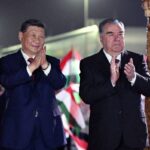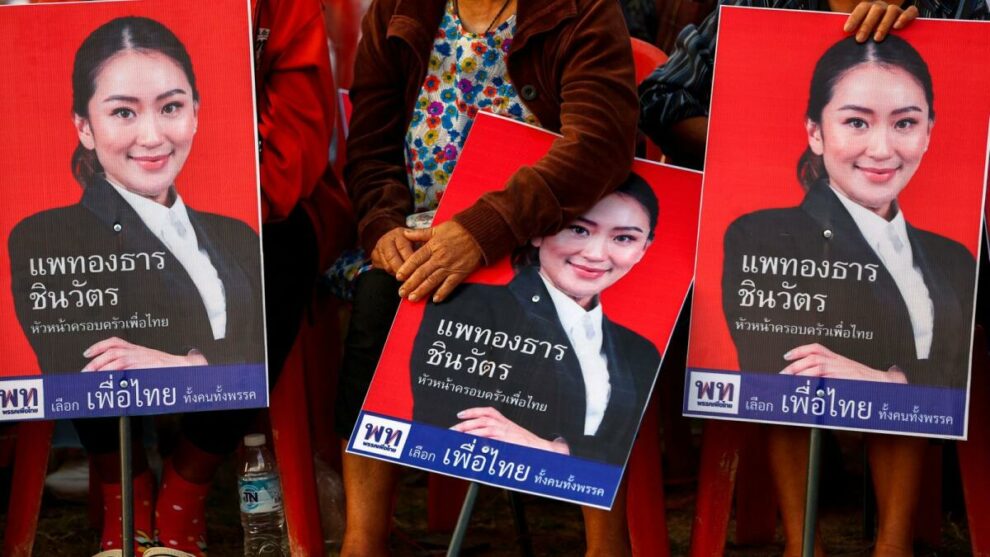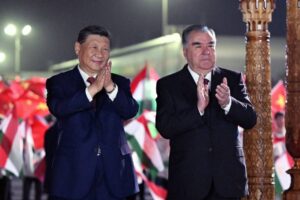Prayuth, Pheu Thai and Move Forward eye escape from middle-income trap
In a clearing shaded by rubber trees, Paetongtarn Shinawatra was greeted with applause by hundreds of her family’s most ardent supporters — the farmers of Udon Thani.
Sitting on the grass among them, the 36-year-old prime ministerial hopeful called the province her party’s “capital in the northeast” and recalled her self-exiled father, former Prime Minister Thaksin Shinawatra, founder of the party now known as Pheu Thai.
“When Pheu Thai was in government, the economy was up,” she said. “We will bring back that time again.”
As politicians file their candidacies this week, those vying to be part of the next government are dangling generous handouts and subsidies. But so far the race has produced few fresh, concrete proposals to support new industries and restore Thailand’s competitiveness. In the fertile northeast, many seem eager for a return to what they remember as the good old days, before the 2014 coup that ousted Thaksin’s sister and Paetongtarn’s aunt, Yingluck Shinawatra.
Yingluck’s government had doubled paddy rice prices but incentivized farmers to chase volume over quality. Critics allege that the scheme devised by Thaksin was rife with corruption and contributed to Thai rice ceding global market leadership to India and Vietnam.
Now Paetongtarn is talking to farmers about using precision technology to improve crop yields and finding new markets for Thai agriculture.
Monit, a 58-year-old rice farmer who sunk into debt in the past year as crop prices fell while the cost of fuel and fertilizer soared, expressed confidence in the novice Paetongtarn, also known as Ung Ing. “She’ll be just like her father,” Monit said.
With 133 out of 400 constituent seats in the House of Representatives, the northeast will again be key for the Shinawatra clan and Pheu Thai, which is favored to win the May 14 elections. But experts warn that a failure to deliver broad economic benefits could further derail Thai democracy.
Pheu Thai is promising a reset after what it calls a lost decade under the military-linked regime of Prime Minister Prayuth Chan-ocha, a retired army general who led the 2014 coup. Prayuth, for his part, believes his record supports his bid for two more years — the maximum he can serve according to the constitutional court. “Who ran the country through COVID so we can be here today?” Prayuth asked supporters at a March rally of his new party, United Thai Nation (UTN).
“Even though we face crises, we are still doing well,” Prayuth said. “Investment from overseas is expanding.”
Thailand last year won $20 billion in investment pledges from a range of sources that included China, India, Saudi Arabia, the U.S. and Japan, according to the Board of Investment. Capital has flowed to the Eastern Economic Corridor, established by the military government in 2017 across three provinces between Bangkok and the Gulf of Thailand, as part of an economic policy known as Thailand 4.0. The EEC houses new industries — an electric vehicle supply chain, battery and electronics manufacturing, and renewable energy.
Prayuth wants to create more industrial zones in four regions, as does Pheu Thai. UTN recently assembled an economic team that includes names from stalwarts of the Thai economy — energy, property and manufacturing.
“The strategy for Thailand to move forward is to take care of everyone, all levels of the economy — establishment, grassroots, farmers,” Prayuth said. “We need to make them happy.”
But the “Land of Smiles” has long been trapped in upper middle-income status, unable to move its workforce into high-paying service jobs or value-added manufacturing. Economic growth has not reached 5% since 2012, falling behind neighbors like populous Indonesia and rapidly developing Vietnam.

As the curtain closes on the current government, structural problems — an aging population, low savings and investment, high household debt and declining export competitiveness — are piling up.
“The previous Prayuth government that launched Thailand 4.0 seemed to have recognized the problem,” former Prime Minister Abhisit Vejjajiwa told Nikkei Asia, “but it never materialized into solutions for the middle-income trap. Most of the policy package was in the mindset of the old industrial age.”
Abhisit, a member of the Democrat Party, declined to run in this election. Democrat leader Jurin Laksanawisit allied with Prayuth’s coalition in 2019 and has since served as commerce minister.
Although a 1.5 trillion baht ($44 billion) government stimulus program, the largest in Asia, preserved household incomes through the pandemic, inflation over the past year erased gains in real wages. Unemployment continued to decline in the fourth quarter of 2022 to 1.15%, but many younger and less experienced workers remain jobless or underemployed.
This group of voters — unprepared for future industries and removed from old ones like agriculture and tourism — are primed for political alternatives. This is elevating another opposition force, the Move Forward Party, in Bangkok and its surrounding industrial provinces.
Residents of Laem Chabang gathered on a Friday night in March to listen to the party’s founder, Thanathorn Juangroongruangkit.
“I’m 45 years old, and if we look back 45 years ago, Taiwan and Thailand were at the same level of economic development,” Thanathorn, the heir to manufacturing group Thai Summit, told the crowd. “But today Taiwan’s income per person is six times higher than Thailand’s.
“The answer lies in localized technology. Taiwan has become the production hub of the most cutting-edge semiconductor chips.”
Elected to the House in 2019, Thanathorn was disqualified from public office by the constitutional court and slapped with charges ranging from violations of election law to insulting the monarchy. Now, he helps draw supporters to rallies for Pita Limjaroenrat, the party’s parliamentary leader and prime minister candidate.
In Laem Chabang, where many residents work for the likes of Mitsubishi Motors, Hitachi and Isuzu Motors, Thanathorn told the crowd: “In the industrial estates, all we get to do here is take orders from Japanese and Westerners. Without our own technology, there’s no way for our country to become rich.”
Move Forward’s platform includes strengthening antimonopoly laws to restore competition and innovation, particularly in national security industries such as telecommunications and information technology. Thanathorn and Pita were prominent opponents of last year’s megamerger deal between second- and third-ranked mobile operators True Corp. and Total Access Communication (DTAC), which was also criticized by some ruling coalition members.
The government-appointed telecoms regulator allowed the merger — the latest in a string of consolidations by major conglomerates, from telecoms and energy to food retail and financial services. Some considered it a victory for vested interests.
“There’s only one reason they don’t want Thailand to advance,” Thanathorn said, “because this societal structure takes advantage of the majority, and they benefit from it.”
Yet Move Forward’s appeal to young voters may not secure its position in a coalition government with Pheu Thai, which is aiming for 310 seats but could struggle to achieve a single-party landslide. Rumors of a possible deal between Pheu Thai and Deputy Prime Minister Prawit Wongsuwan of Palang Pracharath, Prayuth’s former party, have swirled in recent weeks. In a February interview, Move Forward’s Pita disavowed joining any government with Palang Pracharath or UTN.
Meanwhile, erstwhile allies Prayuth and Prawit are competing over the state welfare card program. The former’s UTN wants to raise the monthly payment for low-income citizens to 1,000 baht, while the latter’s Palang Pracharath would increase it to 700 baht.
Prayuth would continue the 1,000-baht monthly allowance for elderly Thais over 60. Palang Pracharath would raise it to as much as 5,000 baht for citizens over 80.
Over the course of the pandemic, the government already disbursed 1.38 trillion baht in cash transfers and subsidies for goods and services. Broad-based energy subsidies added to the fiscal deficit as the government bore energy price shocks from the war in Ukraine.
Economists have criticized the populist nature of many party platforms. The collection of election pledges mostly focuses “on solving problems or responding to people’s immediate needs,” wrote the Thailand Development Research Institute (TDRI), an independent think tank. “It does not really increase the country’s capabilities in the long term. That is, it does not help increase the skills of the workforce.”

This has long been a problem, but now the procrastination comes as Thailand enters a critical period to secure its position as a regional hub for EV and battery production. Despite zones like the EEC, the country once known as the Detroit of Asia risks losing its competitive advantage to mineral-rich Indonesia, which is luring EV makers by banning exports of its vast supplies of nickel.
Private sector groups have warned that proposals for more minimum wage hikes from Pheu Thai and Move Forward could scare off foreign investors. The monthly minimum wage in Thailand is now the highest in Southeast Asia after Prayuth’s government raised the daily wage by 5% on average in October, according to the World Bank.
“Every policy’s goal is to increase the income of the people,” Paophum Rojanasakul, director of Pheu Thai’s policy center, told Nikkei Asia. “We do not want to create a welfare state, but a system where people can stand on their own legs.”
But where will all the money come from?
The TDRI estimates that the policies outlined by various parties would require 2 trillion to over 3 trillion baht beyond the current budget.
With Prayuth running as the continuity candidate, Pheu Thai is promising faster economic growth followed by constitutional reform. Move Forward calls for the same but in reverse order.
“You have one chance to get rid of them, otherwise this will continue forever,” Pheu Thai politician Nattawut Saikua warned supporters in Udon Thani about the military-linked government. The opposition fears that if Prayuth prevails, his supporters would amend the constitution to remove term limits.
But the TDRI warned of the danger of not following through.
“If the new government does not include the important policies of the coalition parties,” its experts wrote, “people will lose their faith in democratic politics because they feel they are deceived by politicians. This will result in making the establishment of democracy in Thailand more difficult.”


















